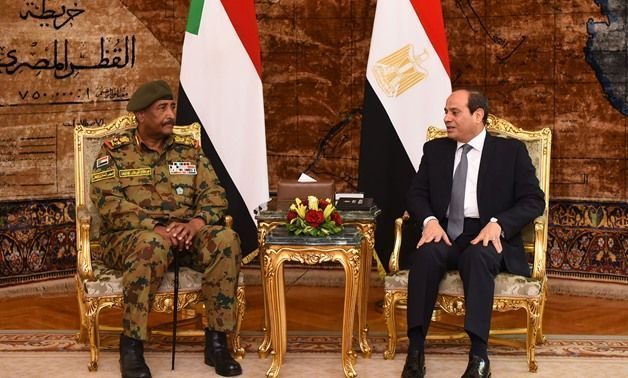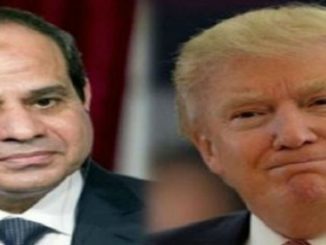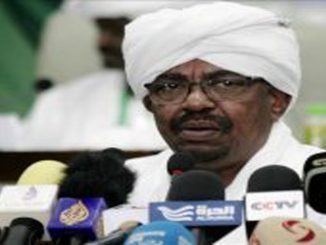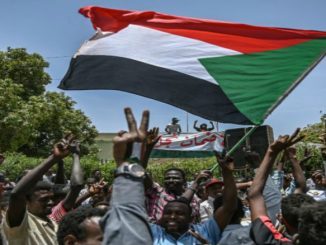
Sudanese military ruler General Abdel Fattah al-Burhan met his Egyptian counterpart on Tuesday in his first trip abroad since the April outbreak of war in Sudan, a day after rejecting calls for fresh negotiations.
The two discussed the offer of Egypt’s Abdel Fattah al-Sisi to mediate the conflict during a short meeting in the coastal city of El Alamein, an initiative Burhan said he welcomed, according to an Egyptian presidency statement.
On Monday, Burhan said the regular army he leads would vanquish the paramilitary Rapid Support Forces (RSF) and never sign a deal with them, dashing new hopes of talks to end a war that has plunged Sudan into overlapping humanitarian crises.
The visit represents the first time Burhan has left Sudan since the April 15 start of the conflict, which broke out amid discord over plans to integrate their troops into a single force as part of a transition to democracy.
Burhan is also expected to visit Saudi Arabia, which along with the United States had held meetings with the two sides that yielded ceasefire pacts that were all violated in short order.
In brief comments from El Alamein, Burhan said he wanted to end the war, but did not mention the possibility of talks.
“We ask the world to take an objective and correct view of this war. This war was started by a group that wanted to take over power, and in the process it has committed every crime that could come to mind,” Burhan said.
The RSF has been accused of looting homes and raping dozens of women, according to activists and victims, and of ethnic warfare that has driven out hundreds of thousands of residents of El Geneina in West Darfur.
The RSF has denied the accusations but said that any of its fighters found involved in abuses would be brought to justice.
Two Egyptian security sources said that while the RSF had also said it welcomed the Egyptian initiative, which includes a call for a months-long ceasefire, it had appeared reluctant to take any further steps.
“The PR advantage is with Burhan,” said a Western diplomat, adding that although Western nations see both sides of the conflict as belligerents, Burhan’s appearances outside Khartoum would shore up his status.
Both the regular army and RSF have been accused of fighting in residential areas and indiscriminately firing heavy weapons, resulting in hundreds of civilians killed in the capital and other major cities. They both deny the allegations, accusing each other of targeting civilians.
In Nyala, capital of South Darfur and one of Sudan’s most populous cities, fighting has cut off phone networks, electricity and humanitarian aid for weeks, with tens of thousands of residents trapped.
In one incident documented by medical aid agency MSF and local residents, about two dozen people, including multiple members of several families, died when caught in crossfire while hiding under a bridge on Aug. 23.
Egypt’s position
Following the outbreak of violent fighting in Sudan, Egypt’s Abdel Fattah Al-Sisi told the UN that he is “deeply concerned over the ongoing clashes” and warned of the “dangerous repercussions on the country’s stability”.
In recent years, Sisi has ensured close ties with Sudan, as talks with Ethiopia over the Grand Ethiopian Renaissance Dam (GERD) are at a deadlock and stability in Sudan has been viewed as integral for Egypt’s own national security on account of unrest in Libya and Ethiopia.
Although his grand projects have been stymied in the past few months due to pressure from Gulf states and the IMF to exhibit fiscal frugality, Sisi continues to model himself as the father of the Egyptian nation.
In the past weeks, Sisi has positioned himself as a regional leader intent on mediating peace in Sudan and eager to engage with the international community to assist his neighbor.
The conflict could represent an opportunity for Sisi to re-assert his status at an international level, while Cairo’s intervention may be required as Sudan and Egypt’s political fates are deeply intertwined.
Egypt’s powerful military ruler has primarily been seen to support General Abdel Fattah al-Burhan, the head of Sudan’s army and transition council. The two generals signed an agreement in 2021 to strengthen military cooperation and have met on several occasions, largely to discuss the developments of the GERD project.
“Traditionally Egypt has supported the Sudanese army, no matter who’s in charge of it over the years,” said David Shinn, former US ambassador to Ethiopia and African Affairs professor at George Washington University.
“I’d be very surprised if they would shift their position, and I think the army is in a stronger position anyway.”
But this isn’t to say Sisi hasn’t been associated with Rapid Support Forces (RSF) leader Mohamad Hamdan ‘Hemedti’ Dagalo in the past.
“Egypt has received official visits from both Burhan and Hemedti in the last couple of years. Sisi has also met with Hemedti during his visit to Khartoum before,” said Sherif Mohyeldeen, a specialist on Sudan-Egypt border relations.
“Despite its standing with the official army of Sudan, Egypt is showing more flexibility than its early policy toward the Libyan conflict.”
Sudan’s stability is in Egypt and the region’s strategic interest, but Cairo is highly unlikely to engage directly at this stage and will focus its energy on peace-making efforts, according to several Egypt-based political analysts.
This past week, Sisi affirmed his intention of non-interference in Sudan, and all Egyptian troops taken hostage by the RSF have now been returned safely. As Mohyeldeen said, “Egypt’s foreign policy when it comes to military intervention is not to intervene directly, unless it’s the last possible option”.
Shinn echoed this sentiment. “I would be very surprised if Sisi would take unilateral action and enter uninvited, but perhaps if Burhan felt sufficiently threatened by the RSF or anyone else for that matter.”
As the fighting escalates with no signs of slowing, Sudan’s neighbor and political ally Egypt may inevitably be drawn to take some kind of action, according to the analysts.
Shinn believes it’s already implied that Burhan may ask Sisi for assistance due to the presence of Egyptian air force troops in Northern Sudan.
“That may have been a routine kind of engagement on behalf of Egypt and may not have been as a result of any perceived threat coming from Hemedti, but I find the timing of it rather interesting,” he said.
“It may very well have been a concern of Burhan that Hemedti would try something like this, and therefore Burhan would want to have the Egyptians in Meroe in the northern part of the country.”
In the past few decades, Egypt has maintained a highly militarised position along the Egypt-Sudan border and following the 2021 agreement it has held joint military training sessions on the Sudan side of the border. This includes the one last week in the northern Sudanese city Meroe, where over 200 Egyptian hostages were taken by the RSF.
Despite military agreements and cordial diplomatic relations in recent years, Egypt has kept up a strict, hard border with Sudan and demands stringent visa requirements. According to Human Rights Watch, an estimated two to five million Sudanese migrants live in Egypt, with the majority entering the country by unofficial means and remaining undocumented.
Following the onset of fighting, fleeing Sudanese citizens still need a visa to cross the Egyptian border. However, as the fighting continues this could be relaxed.
Mohyeldeen is hopeful that Egypt will support Sudan and provide assistance, “but with international support, as the domestic socio-economic situation has deteriorated in Egypt during the past two years”.



